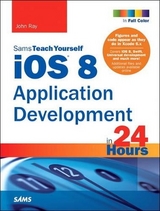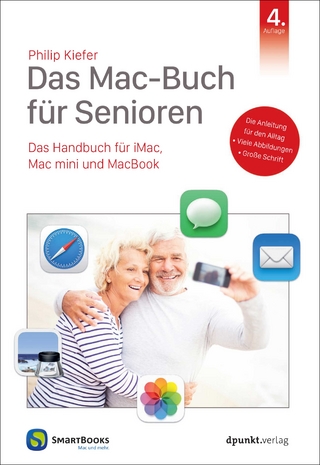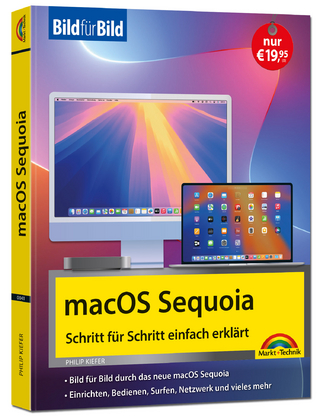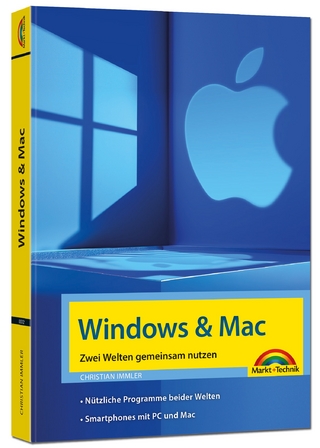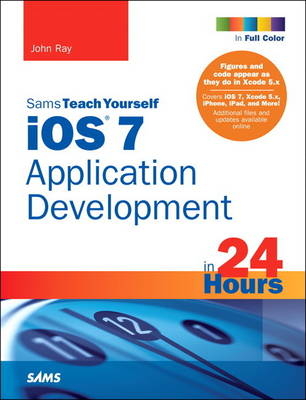
iOS 7 Application Development in 24 Hours, Sams Teach Yourself
Sams Publishing (Verlag)
978-0-672-33706-2 (ISBN)
- Titel erscheint in neuer Auflage
- Artikel merken
Covers iOS 7, Xcode 5.x, iPhone, iPad, and More!
Additional files and updates available online
In just 24 sessions of one hour each, learn how to build powerful applications for today’s hottest handheld devices: the iPhone and iPad! Using this book’s straightforward, step-by-step approach, you’ll master every skill and technology you need, from setting up your iOS development environment to building great user interfaces, sensing motion to writing multitasking applications. Each lesson builds on what you’ve already learned, giving you a rock-solid foundation for real-world success!
Step-by-step instructions carefully walk you through the most common iOS development tasks.
Quizzes and Exercises at the end of each chapter help you test your knowledge.
By the Way notes present interesting information related to the discussion.
Did You Know? tips offer advice or show you easier ways to perform tasks.
Watch Out! cautions alert you to possible problems and give you advice on how to avoid them.
Printed in full color—figures and code appear as they do in Xcode
Covers iOS 7 and up
Learn to navigate the Xcode 5.x development environment
Prepare your system and iDevice for efficient development
Get started quickly with Apple’s Objective-C and Cocoa Touch
Understand the Model-View-Controller (MVC) development pattern
Visually design and code interfaces using Xcode Storyboards, Segues, Exits, Image Slicing, and the iOS Object Library
Use Auto Layout to adapt to different screen sizes, orientations, and iOS versions
Build advanced UIs with Tables, Split Views, Navigation Controllers, and more
Read and write preferences and data, and create System Settings plug-ins
Use the iOS media playback and recording capabilities
Take photos and manipulate graphics with Core Image
Sense motion, orientation, and location with the accelerometer, gyroscope, and GPS
Integrate online services using Twitter, Facebook, Email, Web Views, and Apple Maps
Create universal applications that run on both the iPhone and iPad
Write background-aware multitasking applications using the latest iOS 7 techniques
Trace, debug, and monitor your applications as they run
John Ray currently serves as the Director of the Office of Research Information Systems at The Ohio State University. He has written numerous books for Macmillan/Sams/Que, including Using TCP/IP: Special Edition, Teach Yourself Dreamweaver MX in 21 Days, Mac OS X Unleashed, My Mavericks MacBook, and Teach Yourself iOS 6 Development in 24 Hours. As a Macintosh user since 1984, he strives to ensure that each project presents the Macintosh with the equality and depth it deserves. Even technical titles such as Using TCP/IP contain extensive information about the Macintosh and its applications and have garnered numerous positive reviews for their straightforward approach and accessibility to beginner and intermediate users.
Introduction xv
HOUR 1: Preparing Your System and iDevice for Development 1
Welcome to the iOS Platform 1
Becoming an iOS Developer 6
Creating and Installing a Development Provisioning Profile 12
Running Your First iOS App 17
Developer Technology Overview 20
Further Exploration 21
Summary 21
Q&A 21
Workshop 22
Activities 22
HOUR 2: Introduction to Xcode and the iOS Simulator 23
Using Xcode 23
Using the iOS Simulator 58
Further Exploration 63
Summary 64
Q&A 65
Workshop 65
Activities 66
HOUR 3: Discovering Objective-C: The Language of Apple Platforms 67
Object-Oriented Programming and Objective-C 67
Exploring the Objective-C File Structure 72
Objective-C Programming Basics 84
Memory Management and Automatic Reference Counting 95
Further Exploration 97
Summary 97
Q&A 98
Workshop 99
Activities 99
HOUR 4: Inside Cocoa Touch 101
What Is Cocoa Touch? 101
Exploring the iOS Technology Layers 103
Tracing the iOS Application Life Cycle 109
Cocoa Fundamentals 110
Exploring the iOS Frameworks with Xcode 120
Further Exploration 129
Summary 129
Q&A 129
Workshop 130
Activities 130
HOUR 5: Exploring Interface Builder 131
Understanding Interface Builder 131
Creating User Interfaces 138
Customizing the Interface Appearance 148
Connecting to Code 154
Further Exploration 164
Summary 165
Q&A 165
Workshop 166
Activities 166
HOUR 6: Model-View-Controller Application Design 167
Understanding the Model-View-Controller Design Pattern 167
How Xcode Implements MVC 169
Using the Single View Application Template 173
Further Exploration 191
Summary 192
Q&A 192
Workshop 192
Activities 193
HOUR 7: Working with Text, Keyboards, and Buttons 195
Basic User Input and Output 195
Using Text Fields, Text Views, and Buttons 197
Further Exploration 226
Summary 227
Q&A 227
Workshop 227
Activities 228
HOUR 8: Handling Images, Animation, Sliders, and Steppers 229
User Input and Output 229
Creating and Managing Image Animations, Sliders, and Steppers 231
Further Exploration 252
Summary 254
Q&A 254
Workshop 254
Activities 255
HOUR 9: Using Advanced Interface Objects and Views 257
User Input and Output (Continued) 257
Using Switches, Segmented Controls, and Web Views 262
Using Scrolling Views 279
Further Exploration 288
Summary 289
Q&A 289
Workshop 289
Activities 290
HOUR 10: Getting the User’s Attention 291
Alerting the User 291
Exploring User Alert Methods 301
Further Exploration 318
Summary 319
Q&A 319
Workshop 319
Activities 320
HOUR 11: Implementing Multiple Scenes and Popovers 321
Introducing Multiscene Storyboards 322
Understanding the iPad Popover 341
Using a Modal Segue 352
Using a Popover 364
Further Exploration 370
Summary 371
Q&A 371
Workshop 372
Activities 372
HOUR 12: Making Choices with Toolbars and Pickers 373
Understanding the Role of Toolbars 373
Exploring Pickers 377
Using the Date Picker 385
Using a Custom Picker 401
Further Exploration 417
Summary 417
Q&A 418
Workshop 418
Activities 419
HOUR 13: Advanced Storyboards Using Navigation and Tab Bar Controllers 421
Advanced View Controllers 421
Exploring Navigation Controllers 423
Understanding Tab Bar Controllers 429
Using a Navigation Controller 434
Using a Tab Bar Controller 445
Further Exploration 456
Summary 457
Q&A 457
Workshop 458
Activities 458
HOUR 14: Navigating Information Using Table Views and Split
View Controllers 459
Understanding Tables 459
Exploring the Split View Controller
(iPad Only) 468
A Simple Table View Application 471
Creating a Master-Detail Application 481
Further Exploration 499
Summary 500
Q&A 500
Workshop 501
Activities 501
HOUR 15: Reading and Writing Application Data 503
iOS Applications and Data Storage 503
Data Storage Approaches 506
Creating Implicit Preferences 514
Implementing System Settings 522
Implementing File System Storage 535
Further Exploration 543
Summary 543
Q&A 544
Workshop 544
Activities 545
HOUR 16: Building Responsive and Backward-Compatible User Interfaces 547
Responsive Interfaces 547
Using Auto Layout 552
Programmatically Defined Interfaces 575
Swapping Views on Rotation 583
Further Exploration 590
Summary 590
Q&A 591
Workshop 591
Activities 592
HOUR 17: Using Advanced Touches and Gestures 593
Multitouch Gesture Recognition 593
Adding Gesture Recognizers 594
Using Gesture Recognizers 596
Further Exploration 617
Summary 617
Q&A 617
Workshop 618
Activities 618
HOUR 18: Sensing Orientation and Motion 619
Understanding Motion Hardware 619
Accessing Orientation and Motion Data 622
Sensing Orientation 626
Detecting Acceleration, Tilt, and Rotation 631
Further Exploration 643
Summary 644
Q&A 645
Workshop 645
Activities 645
HOUR 19: Working with Rich Media 647
Exploring Rich Media 647
The Media Playground Application 662
Further Exploration 689
Summary 690
Q&A 691
Workshop 691
Activities 692
HOUR 20: Interacting with Other iOS Services 693
Extending iOS Service Integration 693
Using the Address Book, Email, Social Networking, and Maps 708
Further Exploration 724
Summary 725
Q&A 725
Workshop 726
Activities 726
HOUR 21: Implementing Location Services 727
Understanding Core Location 727
Creating a Location-Aware Application 734
Using the Magnetic Compass 744
Further Exploration 754
Summary 755
Q&A 755
Workshop 756
Activities 756
HOUR 22: Building Background-Ready Applications 757
Understanding iOS Backgrounding 757
Disabling Backgrounding 763
Handling Background Suspension 764
Implementing Local Notifications 765
Using Task-Specific Background Processing 768
Completing a Long-Running Background Task 773
Performing a Background Fetch 780
Further Exploration 785
Summary 786
Q&A 786
Workshop 786
Activities 787
HOUR 23: Building Universal Applications 789
Universal Application Development 789
Creating a Universal Application (Take 1) 794
Creating a Universal Application (Take 2) 799
Using Multiple Targets 803
Further Exploration 806
Summary 806
Q&A 807
Workshop 807
Activities 807
HOUR 24: Application Tracing, Monitoring, and Debugging 809
Instant Feedback with NSLog 810
Using the Xcode Debugger 813
Further Exploration 828
Summary 830
Q&A 830
Workshop 830
Activities 831
Index 833
| Erscheint lt. Verlag | 23.1.2014 |
|---|---|
| Verlagsort | Indianapolis |
| Sprache | englisch |
| Maße | 180 x 230 mm |
| Gewicht | 1140 g |
| Themenwelt | Informatik ► Betriebssysteme / Server ► Macintosh / Mac OS X |
| Informatik ► Programmiersprachen / -werkzeuge ► Mac / Cocoa Programmierung | |
| Informatik ► Software Entwicklung ► Mobile- / App-Entwicklung | |
| Informatik ► Weitere Themen ► Smartphones / Tablets | |
| Technik ► Nachrichtentechnik | |
| ISBN-10 | 0-672-33706-1 / 0672337061 |
| ISBN-13 | 978-0-672-33706-2 / 9780672337062 |
| Zustand | Neuware |
| Informationen gemäß Produktsicherheitsverordnung (GPSR) | |
| Haben Sie eine Frage zum Produkt? |
aus dem Bereich
